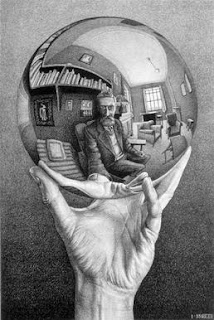I describe in Hunting Magic Eels the rise of "the neurotic self" in the modern world. That is, as belief in God fades in the modern world we increasingly turn inward to discover a ground of being, value, and meaning within ourselves. We no longer look "up" but "in." Through subterranean self-exploration, as spelunkers of the soul, we wander through the mineshafts of our psyche seeking our "true," "real," and "authentic" selves. And having discovered this "true self," like digging up a diamond in a coal mine, we set it as our North Star, seeking to stay loyal and true to ourselves.
And if that fails, if we return to the surface empty handed, we turn outwards toward each other, co-dependently hoping that the meaning of your life can be borrowed as my own.
Trouble is, it's all quicksand. Spend any time at all wandering the mineshafts of your mind and you'll quickly discover that we are unsteady, uncertain, unwell people. Our turn inward in the modern world hasn't stabilized our lives, it has set us adrift.
Relationships are also a snarl of dysfunction. The people we borrow meaning from are themselves as broken, confused, lost, and unwell as we are. Neurosis mixes with neurosis in an enmeshed tangle of neediness. We are unable to provide steady help for each other because we need so much help ourselves. Just look at social media, it is a circus tent full of funhouse mirrors where distorted, twisted images stare back at other distorted, twisted images. Every screen is a portal into a vast, churning sea of human insecurity, confusion, and anxiety.
So where are we to turn? Wherever we look, inside ourselves or outward toward each other, every mirror I find is either broken or distorted. I'm never able to get a clean look at myself or a clear look at you.
It's here, argues Williams, where we need a relationship that is fundamental and foundational, a mirror that is steady and clear. Something transcendently solid where we can find constant, unconditional rest. Something possessing an eternal, oceanic calm beyond the stormy churn of human need and the anxious raining of my own mind. God, dear readers, is this grounding, fundamental relationship. God is how we escape the quicksand of neurosis and the needy, inconstant web of human brokenness.
Here is Williams describing this relationship, the quote I have been meditating on:
We are here, then, we are real, because of God’s ‘word’; our reality is not and cannot be either earned by us or eroded by others. And to say that we are unilaterally dependent on God is to recognise that God alone is beyond the precarious exchanges of creatures who need affirmation. With God alone, I am dealing with what does not need to construct or negotiate an identity, what is free to be itself without the process of struggle. Properly understood, this is the most liberating affirmation we could ever hear.


